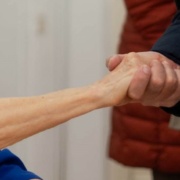The Substance of Things Hoped For

Rome
My first job, upon arriving in Rome, was in real estate. The employer was a posh American lady, in her late sixties and as tough as nails, working in partnership with her ambitious, competitive daughter. In the Eternal City, the two ladies had been able to smell an opportunity in the business of selling and renting houses and apartments to the international community of the wealthy. Me at that time, as poor as a poor fellow can be, they hired for my “fine personality.” I received a stipend that precluded my sleeping with the homeless under the bridges of the Tiber.
With my spare money I bought some presentable clothes, and I soon learned how to show houses in their most attractive form to businessmen, diplomats and celebrities. Most of them were charmed by my “fine personality,” and contracts kept coming in, to the satisfaction of my boss and to the dismay of her daughter, whose competitive attitude towards me worsened with each success that was achieved through my humble services.
My heart was restless. A part of me was tempted to use my “charm” as a means to obtain some favorable position at the court of one of my boss’s clients. Another part, affectionate and modest, said: “Enough of this show! You know there is more. Be who you really are and figure it out!”
 For a while, temptation had the first say. Soon my prayer for a complacent life solicited a response from the Universe. A German businessman developed fatherly feelings for the youth I was then. He liked the apartment I had found for him and, to compensate, took me out for dinner a few times. Conversation was completely centered around his life. His wife and two daughters were securely settled in his villa, with a yacht, some fancy cars and a golden credit card to buy all the good things that money could buy. He would return home only for vacation, between one foreign business venture and another.
For a while, temptation had the first say. Soon my prayer for a complacent life solicited a response from the Universe. A German businessman developed fatherly feelings for the youth I was then. He liked the apartment I had found for him and, to compensate, took me out for dinner a few times. Conversation was completely centered around his life. His wife and two daughters were securely settled in his villa, with a yacht, some fancy cars and a golden credit card to buy all the good things that money could buy. He would return home only for vacation, between one foreign business venture and another.
During the last supper that I had with him, he looked at me and said: “I was like you, very gifted musically. I played the piano and my teachers had high hopes for me. I was also spiritual. But I soon realized that without money you can’t get anywhere in this world. So I woke up and went into business. Look what I have now! Travel, comfort and fun!”
Then he hinted at how he could help me to follow in his footsteps. “I can teach you everything you need to know about business,” he said, “and I can already pay you a nice salary, if you give full availability!”
I did perceive the affection in his words. However, his coarse business energy was radically different from qualities that my own affectionate father had given me: sensitivity, depth, love of literature and a complete lack of interest in “the ways of the world.” Was I going to betray all that by accepting a position at the court of this man, whose sole faith seemed to be invested in his bank account? Would my life, too, become dedicated to “all the things that money can buy?”
After that dinner, on my way back to the shabby cellar that was my home on the outskirts of the metropolis, my heart felt as empty as my stomach was full. Many misgivings arose regarding the future of a young man who would have to become habituated to the complacency in which people like this false-surrogate father excelled.
 The next day at work, it turned out that my boss was on a business trip. The one on the throne, with grim delight, was now her daughter, whose tyranny I could not bear without losing my dignity. The repentance that I was beginning to feel as a consequence of the wrong directions I had been taking in my life, now compelled me to decide fast: I didn’t wait until the end of the month for my stipend; I simply disappeared without notice, determined to find employment that would better resonate with my own deeper nature.
The next day at work, it turned out that my boss was on a business trip. The one on the throne, with grim delight, was now her daughter, whose tyranny I could not bear without losing my dignity. The repentance that I was beginning to feel as a consequence of the wrong directions I had been taking in my life, now compelled me to decide fast: I didn’t wait until the end of the month for my stipend; I simply disappeared without notice, determined to find employment that would better resonate with my own deeper nature.
Now that I had resolutely stopped courting the kings and the mighty of this world, my life force came back, and with that, the realization that what had been increasingly absent was the very substance of my life: the faith that comes to him who has the courage to follow the deepest promptings of his heart.
I later learned the Italian equivalent of “substance”: sostanza, which, used in the plural, also means money. After my youthful experience, I gradually came to realize that, without a real substance keenly perceived in body and mind, no money that I made would ever really feel like mine. I sensed that my financial end-of-life report, shown to me at the final film projection of my life just before closing my mortal eyes forever, would include only the money that was somehow related to that substance. Just as life begins before breath and digestion, so this inwardly perceived substance must come before any financial income.
Maybe these musings about the subject of money made Sri Yukteswar’s majestic opening lines in The Holy Science, which I first read years later, so thrilling to me. The great Gyanavatar writes:
 Man possesses eternal faith and believes intuitively in the existence of a Substance, of which the objects of sense (…) are but properties. As man identifies himself with the material body (…) he is able by these imperfect organs to comprehend these properties only, and not the Substance to which these properties belong. The Eternal Father, God, the only Substance in the universe, is therefore not comprehensible by man of this material world, unless he becomes divine by lifting himself above this creation of Darkness or Maya.
Man possesses eternal faith and believes intuitively in the existence of a Substance, of which the objects of sense (…) are but properties. As man identifies himself with the material body (…) he is able by these imperfect organs to comprehend these properties only, and not the Substance to which these properties belong. The Eternal Father, God, the only Substance in the universe, is therefore not comprehensible by man of this material world, unless he becomes divine by lifting himself above this creation of Darkness or Maya.
Further on in the book, Sri Yukteswar explains how this Substance can be felt through yoga techniques that involve regulation of the breath and intuitive life-force control.
I was blessed to receive initiation in his Kriya yoga technique, which has now become part and parcel of my life and daily connects me with my own Substance.
Yet I have always been grateful to have felt some of that inner reality much earlier in my life, when I had decided to be loyal to my own true self. Sri Yukteswar writes that eternal faith is always ours, and that we should act according to its promptings, for — in harmony with words of the apostle Paul — it is the substance of everything we can ever hope for.


One Comment
Enjoyed your sharing a lot, Darshan.
Follow your heart!